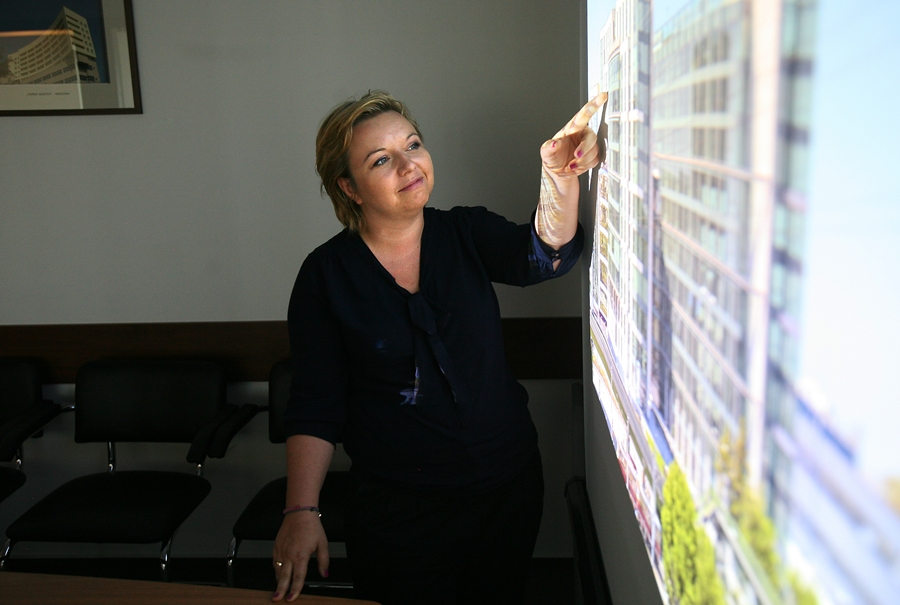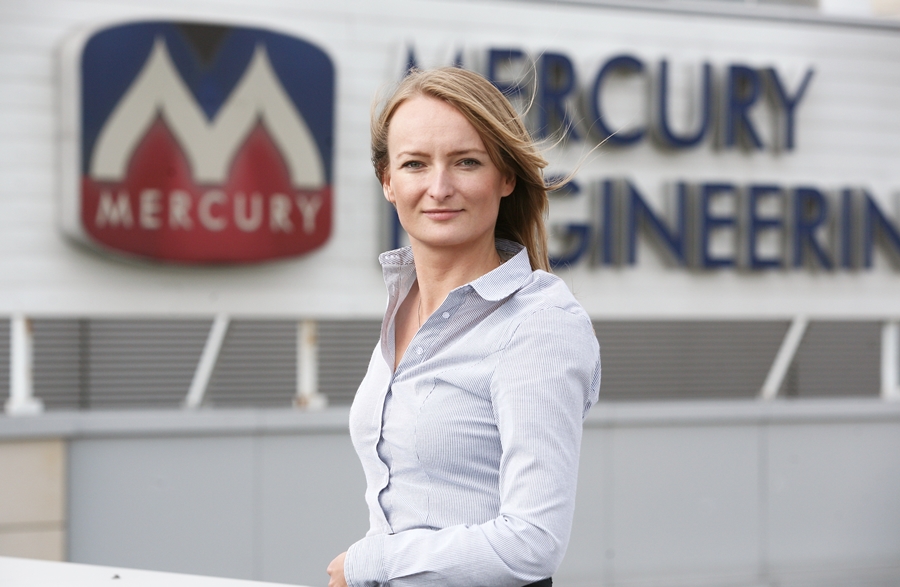Mercury Engineering, implemented SAP ERP system in 2006. Fundamental aims established by the company were to improve and to enhance staff management and exchange of information necessary for managing the business activity between the head office, regional offices and all construction sites across the world. In a long-term perspective the company expects to save money and improve efficiency so that it can maintain a competitive advantage and high quality of services.
The SAP ERP system was rolled out to the Mercury UK and Middle East offices in 2010, and since February 2011 the system has been operating in Mercury Polska.
The rollout of SAP corporate template at Mercury included the financial, controlling, purchase and project and human resources management, as well as Cumulative Billing Solution (CBS), additional bespoke SAP customization, tailored for Mercury to meet business processes associated with sub-contractors and customers.
Avnet Client Solutions, one of Ireland’s leading IT business solutions providers, is Mercury’s global implementation partner with regard to SAP rollouts. BCC (now All for One Poland) was Avnet’s partner on the project carried out for Mercury Polska, and was responsible for aspects of implementation of SAP FI and SAP HR-PY functionalities according to Polish business and legal requirements.
From Ireland to Poland
The model for the Mercury SAP system was designed in Ireland, based on business practices at that time and with regard to the specific characteristics of the industry and construction, tax and employment law in Ireland. Launching SAP in subsequent countries required adjustments for local conditions. Poland was the third region, after Middle East & UK, to rollout the corporate global solution at Mercury – although here the range of necessary changes turned out to be much wider.
During the system configuration, particular attention was given to areas including methodology of revenue recognition, the specific characteristics of VAT, calculating long & short term retentions, as well as the whole payroll module.
Similarly to the way things work on such projects, BCC consultants, having experience in SAP implementations and understanding the local circumstances, worked with Mercury and Avnet consultants in preparing concepts of corporate template extensions necessary for the Polish division. Avnet was responsible for the implementation of the extensions.
Current project valuation
Contracts for construction works are usually characterized by long completion periods, and the hand-over takes place in a reporting period different than the one the works were commenced in. Services under long-term contracts (with completion period longer than six months), which are started and not completed, as of the balance sheet day, are subject to specific rules of valuation.
At Mercury Ireland, such valuation is done according to the progress of works. Project Managers make the assessment and a percentage estimate reflects the assessment in the system with regard to planned sales and costs of a given project.
In the Polish division, the percentage-of-completion method was used (POC). The method is also commonly used in Poland and accepted by the Accounting Act.
Developing a solution that would facilitate receiving a parallel project valuation as per the valuation used thus far was of high importance for Mercury Polska.

Agnieszka Osuch SAP FICO Coordinator, Mercury Polska
“Currently, valuations are made by two methods in Poland. The Mercury Group requires consolidated data from local offices. The cost method facilitates obtaining a proper balance sheet and profit and loss account according to the Accounting Act”, sums up Agnieszka Osuch SAP FICO Coordinator at Mercury Polska.
Polish finances in SAP
Apart from partaking in concept works on the aforementioned solutions, BCC’s main tasks included configuration of the system to meet Polish business and legal circumstances with respect to SAP.
SAP FI implementation included standard financial and accounting processes and fixed assets management. Polish version of SAP FI and SAP FI-AA is fully configured to Polish legal regulations and requirements of financial accounting standards. BCC’s Consultants, on the basis of the concept analysis, launched a solution that was to a high degree analogous with the template, making necessary corrections and changes involving the needs of the Polish accounts department.
Thus, it was a classic rollout with regard to SAP FI. As SAP FI Consultants uniformly emphasize, Poland is a ‘difficult’ country in this respect and usually it is the common charts of accounts and VAT handling that require customization.
Chart of accounts
In order to unify accounting settlements in the Mercury Polska group, a corporate chart of accounts was adopted. This is a standard practice in SAP rollouts. Mapping the new structure can be a difficult task for the company.
The corporate chart of accounts has to be adopted in such a way as to enable a correct presentation of the profit and loss account and balance sheet, as well as proper qualification of costs for income tax. As a result, additional GL codes were incorporated into the chart of accounts in SAP for the Polish divisional requirements.
VAT in the construction industry
As already said, VAT can be a challenging area during SAP FI rollouts.
“The complexity of Polish tax law gets even more complex in the construction industry, where a particular tax obligation is in force. An additional element that had to be taken into consideration during the planning and data migration phases was the change in VAT rates, coming into force a month before the date of system GoLive”, says Agnieszka Osuch.
Mercury’s global corporate solution needed to include the above requirements for Poland and the tax coding and VAT date concept needed to be updated in the system.
Foreign currencies
Foreign currency transaction handling rules and regulations regarding valuations and reconciliations are another significant challenge in the process of SAP implementation. The daily rate of exchange and FIFO bank accounts valuation required additional system modifications, and their implementation, in turn, required change approval in the corporate solution.
Working time, project duration
At Mercury, a lot of processes relating to human resources management in SAP is connected with logistics functions (similarly to FI). They include work time registration with regard to particular construction projects and working hour’s assessment (e.g. overtime costs, night shift costs and absence costs).
Employees master data and data for work time registration and assessment are gathered in the implemented CATS tool (Cross Application Time Sheet), which constitutes a middle layer and basic source of data for both the logistics system (e.g. for project loads) and SAP HR.
Work time is registered in the corporate SAP NetWeaver Portal or directly in SAP GUI via CAT2. The employees log into the portal and enter their working time data. The manager approves data before work time reconciliation and calculating remunerations.
Customization in CATS and the portal was Avnet’s domain, while BCC handled a role of explaining the specifics of Polish labour law and rules of calculation of remuneration in order to reflect them in the tools that are components of the SAP template at Mercury Engineering.
HR and payroll
BCC (now All for One Poland) Consultants were also responsible for implementing SAP HR-PY tools (HR and payroll) in the Polish division of the company. Due to rather complicated rules of work time management and remuneration calculation in Poland, BCC uses Time Manager’s Workplace (PTMW) in SAP HR projects. It is a standard SAP HR functionality in the area of managerial self-service. An easy-to-use tool supports modification and reporting of employees’ data including absences, overtime, business trips and leaves in a transparent form. This is a gross simplification in calculation and control of multi-component remuneration. PTMW is not used with the Irish solution but was launched for Mercury’s Polish HR Department. Due to requirements of the Polish legislator, BCC also prepared reports on the record and registration of working time.
Good communication is a must
For SAP rollouts to divisions in other countries, project challenges do not lie only in the functional range of the system. The engagement of many participants in the work, who have various professional experiences, knowledge of the system and, in this case, also different nationalities, is a characteristic feature of this type of project.
Mercury Engineering’s implementation team was composed of system analysts from the Irish headquarters, having their area of specialization in corporate solution, and Polish key system users knowing the local legal circumstances and business needs. Avnet, the implementation partner, is a company expert in SAP while experience in such projects in Poland, knowledge of the system and local legal and tax regulations were BCC’s asset.
The total of all participants’ expertise translates into success of the project. That is why communication and knowledge transfer are so important. It is not just a matter of the language of communication. A bigger challenge lies in specifying a communication plan, escalation paths, ways of informing participants about works progress in particular phases and about potential changes to the concept or schedule at the very beginning of the project.

Renata Kozyra, SAP Project Manager, Mercury Engineering
“At Mercury, the knowledge was transferred mainly during concept meetings and training that was executed upon project commencement. The key users got acquainted with the corporate solution at a very early stage and areas requiring special attention were by then defined”, emphasizes Renata Kozyra, SAP Project Manager at Mercury Engineering in Poland.
In the subsequent stage, pursuant to Avnet methodology that turned out to be very similar to All for One GoForward methodology, user training, configuration and testing were carried out on the copy of system template made for the Polish organizational unit.
Timely and successful SAP system implementation would not be possible without the high priority that was placed on the project at all levels throughout Mercury. An explicit statement made by the management board, that the implementation works were as significant as current tasks, was a valuable comment, especially as it was backed by real actions. At Mercury, great importance was attached to ensuring that there are enough resources for project works – some staff members, the key users in particular, focused on SAP implementation-related tasks only.
Renata Kozyra concludes: “SAP implementation at Mercury was very successful. Process integration in the company, owing to the ERP solution, yields improvement of effectiveness and better intercompany communication. This in turn, directly translates to constant improvement of the quality of services provided for our customers in Poland and across the world”.
Co-operation: Beata Niemiec-Siwek, Magdalena Pawlukiewicz, Magdalena Włodarz-Furmańska
Mercury Engineering is a world-class provider of engineering solutions. Founded in 1972, the company is headquartered in Ireland. At present, the company has offices in Central and Eastern Europe, the Middle East and North Africa. It is recognised throughout all these markets as a leader in engineering solutions. The company employs the best people, invests heavily in their training and education. It has also implemented a state-of-the-art IT technology and systems and applies the highest standards of management. The company’s revenues exceed €450 million per annum. Since 2000 the company has had their Central European headquarters in Warsaw. In this region, the company offers services for mechanical, electrical and installations, fire protection and data storing technologies, interior fit-outs as well as maintenance and facilities management.


